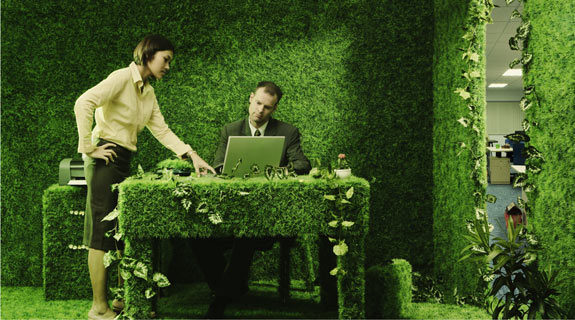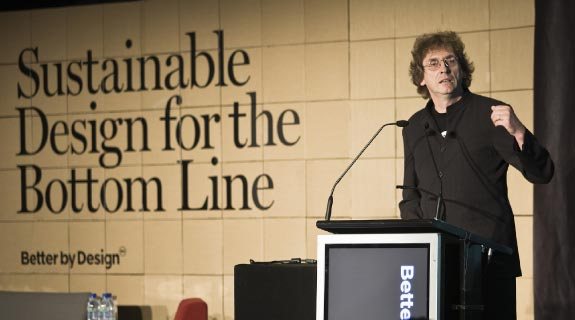Leaders from Germany to Korea are promising to turn around their economies … by turning around the environment. Dave Hansford investigates green jobs in New Zealand. It’s nice work—but can you get it?
The US and the UK are attempting to create millions of green jobs to rev up their economies —and fix a few eco-nightmares in the process. What if the global recession and the world’s environmental crisis could cancel each other out? Could it work in New Zealand? Dave Hansford finds out
Photo: Loungepark/Getty Images
It seems like a no-brainer: the same planet that urgently needs renewable energy and warm homes, where millions of trees need planting and dwindling resources need recycling, is also home to 190 million unemployed people. The solution to both problems might be beautifully simple.
Solving the world’s environmental problems is a big job—and it’ll take a few million people to do it. The United Nations Environment Programme (UNEP) has called for nothing less than the greening of the world’s entire workforce.
Nowadays, anyone’s career can veer down a greener path. Green jobs come in a multitude of shades, from the unskilled (sorting recyclable materials at landfills), through to skilled manual labour (retrofitting insulation), administrative (carbon accounting), creative (communicating behaviour change), consultancy (advising on energy efficiency options), managerial (implementing those options), research (climate change mitigation), right up to traditional ‘eco’ fields like, well, field science.
The Apollo Alliance, a US coalition promoting a shift to clean energy in America, says a green job “has to pay decent wages and benefits that can support a family. It has to be part of a real career path, with upward mobility. And it needs to reduce waste and pollution and benefit the environment.”
Listen to US President Barack Obama and UK Prime Minister Gordon Brown, who each plan to plunge millions of dollars—and people—into the sector, and it seems there is nothing green jobs can’t do. They can simultaneously save both the economy and the environment. They can lift millions out of poverty. They can restore dignity and hope, creating a new, equitable social order. They can offer future-proof careers in uncertain times.
People all over the world are making quite spectacular claims about the environmental sector.
According to the UNEP, growth in wind and solar energy will create eight million new jobs globally.
No fewer than 14.3 million US workers would benefit from a shift to greener practices in energy, building and retrofitting, transport and vehicle production, according to the Political Economy Research Institute at the University of Massachusetts.
Generating just one-quarter of all US energy requirements from renewable sources would create at least five million new job vacancies by 2025, reported the RAND Corporation and the University of Tennessee. Tougher efficiency standards for electrical appliances would add a further 120,000 new jobs to the US economy before 2020, a US Department of Labor study concluded.
In Germany, a government study found that the renewable energy sector could employ half-a-million by 2020.
The Korean government plans to create almost one million new eco-friendly jobs, by injecting US$38 billion into green initiatives.
It all sounds so good. Is there a catch?
New business
Standing in the way of all this goodness is business as usual. A green workforce first needs a green workplace, and that demands a step change in the way we do business.
The study highlights the critical role government plays in stimulating a green economy, and therefore green employment. It also points out the costs of doing nothing: a total of more than 20,000 jobs lost in the primary and tourism sectors in the next decade
The global recession has given us a valuable opportunity to do just that, says eco-entrepreneur Nick Gerritsen. The Marlborough businessman runs a number of ‘cleantech’ enterprises, developing new technology to address environmental problems, including the algae-to-biofuel startup Aquaflow, and Carbonscape, an operation converting forestry wood waste into charcoal.
“What we are witnessing in America at the moment is basically the end of Keynesian economics, which is predicated on growth being the driver of economic wealth,” says Nick. “That’s not viable any more.”
With the growth-at-all-costs model freshly buried, what happens next depends on the direction we take after the funeral. “We need a leap of faith,” he says. That means shifting to what Nick calls ‘post-industrial economics’, which accounts for energy inputs and carbon footprints, as well as the traditional green stuff—money.
Peter Neilson, chief executive of the New Zealand Business Council for Sustainable Development (NZBCSD), believes we need a complete change in business models.
He thinks there’s a real danger that New Zealand will miss the rising global green wave if it doesn’t start paddling soon. Last year, the NZBCSD released a Sinclair Knight Merz study that quantified the impact on the New Zealand economy if the government were to implement the Emissions Trading Scheme (ETS).
Passage of the Bill, it said, could generate more than $12.3 billion in investments over the next decade, creating more than 9,600 new jobs—4,215 of them immediately. The biggest employers would be in agriculture, forestry, wind, geothermal projects, bio-energy, biofuel, biochar, ocean energy and energy efficiency industries, with more in new emissions trading and services.
The study highlights the critical role government plays in stimulating a green economy, and therefore green employment. It also points out the costs of doing nothing: a total of more than 20,000 jobs lost in the primary and tourism sectors in the next decade.
While overseas experience has shown that green initiatives create employment, recent government rollbacks of environmental legislation here—scrapping plans to insulate state houses, lifting the moratorium on thermal power generation, revoking the biofuels obligation—have hobbled the sector’s potential to lift the New Zealand economy.
But many Kiwi businesses aren’t waiting for government leadership. NZBCSD membership was up 50 percent last year from 2007. Member businesses now employ some 88,000 workers, who together contribute annual sales of $59 billion to the economy, equivalent to 43 percent of gross domestic product.
The Sustainable Business Network (SBN) reports similar growth. Chief executive Rachel Brown says its rising membership reflects “a growing need for businesses to understand, and deliver on, sustainability”. Most tellingly, the network—which started out advising large corporates on how to deal with environmental legislation—has in the past five years expanded into virtually every industry.
Since 2005, nearly all of the 150 largest companies in the world have had a chief sustainability officer (or the equivalent) reporting to the chief executive, alongside those with more traditional job titles like chief financial officer and chief information officer.
Getting a greener job
So just how does one train for a green job? Find one? Keep one?
Local and central governments are probably the biggest green hirers, and that’s the market Campbell Hepburn knows best. A recruiter for 13 years, his own employer—Wellington agency The Johnson Group—specialises in filling government vacancies. He says environment jobs started listing five or six years ago. In those days, most had to be filled from overseas, but greater awareness of green issues now sees plenty of home-grown graduates.
The green job market isn’t exactly burgeoning, he says—yet. “I wouldn’t call it significant, but it’s only going to gather momentum; there will be increasing opportunity.”
For now, government vacancies are in “the policy area—environmental policy, resource policy—as well as the regulatory side, which is local government. That’s much more around environmental planning and sustainability.”
Campbell says green-thinking people are often well suited to government roles, because they’re predisposed towards a service ethic. “There’s the attraction, too, of being a part of setting a direction for the future.”
But there are strict skills requirements for work in the public sector. Training in resource management or another relevant field is expected; a science background helps. And be warned: if you end up in an interview at The Johnson Group, you’ll be expected to walk the walk. “We’re looking for eco-credibility,” says Campbell, “so you may well have to demonstrate what you are doing in that sense. We’re looking for someone who can articulate what the present and future issues are.”
Would-be green workers aren’t limited to government roles, though. Green companies like Nick Gerritsen’s need green people to run them, but he’s found them in short supply. “One of the big constraints at the moment is accessing qualified people. A fair number have had to come in from overseas,” he says.
Peter Neilson’s noticed the gap too, and sees problems down the line. Huge retailers—among them the UK’s Tesco supermarket chain and US giant Walmart—are beginning to label the carbon footprints of their products. Within five years, he says, that information will be demanded of New Zealand suppliers.
“A huge trend occurring internationally is that everybody in the supply chain is effectively going to have to provide information on their carbon footprint,” says Peter. “Yet we understand that there are only ten people in the country currently qualified to evaluate whole-of-life, whole-of-supply chain carbon footprints. We don’t have anything near the current requirement of those new skills.”
Where will all these carbon accountants come from?
Campbell says a good all-round qualification would be an environmental studies degree of the type offered at Victoria and other universities. But whatever course you pursue, he says, don’t wait until you graduate. “By the time you’re on the market, all the other graduates are too. Approach your local or regional council, if that’s what you want, and build up relationships in advance.”
Nick agrees with the networking bit, but cautions against prescribed courses of study. “I think we put too much emphasis on formal education. The model of formal education—just like the model of politics and government—is a product of industrial economics, which is failing.”
Instead, he suggests getting out there and talking to people. “Here in Marlborough we have a green drinks group, and we get 20 to 30 people turning up regularly every month. Within that group, it’s very easy to access people who are already participating, to one degree or another, in this new-tech space.”
Megan Hosking, chair of the Sustainability Trust and owner of design agency Alto, likewise urges green job hunters to get connected. She created Intersect (intersect.ning.com), an online network of green thinkers and doers, for “young professionals passionate about sustainability—who are making sustainability their speciality, or finding ways to bring it into their work”.
A growing number of websites are now dedicated to green jobs and networking, and simply typing ‘sustainability’ or a similarly green keyword (except ‘environment’, which will turn up hundreds of listings describing the office space) into the search box on a mainstream recruitment site will also turn up green jobs.
Staying put
You don’t necessarily have to leave your current job to work greener. Many companies are now adopting—in varying shades of green—sustainable management practices. That might mean cutting the power bill, more rigorous recycling practices, or drawing up a carbon budget (see box, page 47).
Megan says anyone can initiate, intrigue and inspire bosses and co-workers into adopting sustainable practices.
“I’m a designer,” she says. “That’s not a green job, it’s just a job. But who I am, and how I participate in that work, is the green bit.”
You don’t even have to be a professional to participate in a green economy, she says. “If you’re a consumer and you make informed choices, you are creating green jobs with every purchase.”
And here lies the latent power of the green economy: the potential for green jobs to radiate across many other sectors.
“There are organisations busy creating not just jobs, but a market around this stuff,” says Megan. “I’m talking about business strategy and communication and voluntary behaviour change. The roles cover sociologists and psychologists, designers, business strategists, as well as insulation installers and plumbers focused on water efficiencies.”
Ready or not?
It’s clear that if we’re to avoid catastrophic climate change, the world’s—and New Zealand’s—economy must be running on a sustainable, low-carbon basis within the next two or three decades. If we pull it off, it will be the biggest social and economic transition since the industrial revolution.
“If we don’t adapt,” warns Peter, “we will forego a huge trend in consumer demand that will have to be met. If we’ve got people looking for retraining and opportunities, we should be making sure they’re going to be available for the jobs of the future.”
Green workers will power what Peter describes as “nothing less than an economic transformation”, but it will need far greater commitment—and investment—from both business and governments.
Offshore, the great green wave is rising. Early in January, UK Prime Minister Gordon Brown unveiled details of a £10 billion investment programme in public works and eco-friendly projects, such as electric cars, wind and wave power, to create 100,000 jobs.
It comes on the heels of Barack Obama’s “new green deal”: the US President’s promise to create five million new US jobs over the next decade through a US$150 billion investment in green technology.
New Zealand has to decide if it wants to be a player or a spectator. Says Nick Gerritsen: “We have to believe that we can come up with our own solutions. We have to be able to demonstrate as a country that we really believe what we say.”
Darren Hill
Electrician
Darren Hill did his first solar panel installation for a friend’s father more than ten years ago. It started off as a hobby, although he’d always been interested in sustainability and self-sufficiency.
His experiments with solar power began on the weekends, when he was working as an instrumentation technician at the steel mill in Waiuku. But moving to a small block of land in Northland, where connecting to the power grid would have cost him $100,000, gave him the perfect excuse to start taking alternative power seriously.
Now, the qualified electrician owns and runs The Watt Shop, doing solar, wind and hydroelectric power installations for clients with a green tinge. Largely self-taught in the “black arts of batteries”, Darren’s also a member of the Able Solar Network, an alliance of specialist sparkies who help each other problem-solve tricky installations.
Networking with sustainably minded people in your industry is a great way to learn, he says, but you’ve got to be passionate about it. —AMcA
www.thewattshop.co.nz; www.ablesolar.co.nz
Gareth Peters
Hairdresser
When Gareth Peters opened his own hair salon a couple of years ago, he was fed up with handling harsh chemicals and inhaling ammonia. “The smell of it was just wrong,” he says. “You’d mix your colour up and have to take a couple of steps back.”
Not anymore. Clients at Nada, in Auckland, are now tinted and tidied with organic colours and hair products. Every product is low on chemicals, from shampoo through to the cleaning products used in the salon. Hair dye is ammonia-free (it can even make you blonder) and highlights are done using paper-like ‘foils’ that are washed and re-used. While you wait, he’ll make you a nice cup of organic coffee or herbal tea.
Gareth has even managed to halve his power bill with a neat trick: put a dry towel in your clothes dryer with your wet washing. “Instead of setting the timer for two hours to dry 30 towels, it’ll do it in about an hour.”
All this has been a great business move for Gareth. “Most of my clients are pulled through the attraction of organic hair colour. If we hadn’t decided to go along these lines, we’d just be any other salon.” —AMcA
www.nada.co.nz
Bianca Talaic
Public relations
The industry that invented greenwash doesn’t exactly enjoy an ethical reputation. But not all PR executives are created equal—and Bianca Talaic is as green as they come.
A lighting designer in her past life, Bianca was worn out by long hours, overseas travel and enormous projects. She knew that if she was going to change her career, it had to be something she could believe in. Last year, she took the plunge and joined Bare PR. The “organic, eco-friendly PR company” represents mainly makers of food, skincare and cleaning products.
“I only took the job in PR because it was about organic and natural products, and I agree with it. I don’t want to push products on anyone, but I like to educate people about what’s available and give them the choice.”
Bianca loves her new career—especially dealing with small business owners who are passionate about their products. She has one piece of advice for those frustrated by less-than-sterling environmental practices in their current jobs: “Either step away and do something else, or be a bit more proactive. If you’re passionate about something, you can do something about it.” —AMcA
www.barepr.co.nz
Damian Young
Engineer
Here’s one way to save yourself the bother of finding the perfect green employer: become one yourself.
Damian Young did just that. Together with four others, he set up engineering firm Morphum Environmental in 2000. It was a bold move—particularly because all five were students at the time, studying environmental engineering at Unitec. After graduation, the new company directors spent more than four years in the workforce, gaining industry experience before tossing in their day jobs for good.
Nine years on, Morphum now employs 13 staff, including ecologists, engineers and geographers. Damian laments the demise of specialist environmental engineering degrees in Auckland. “I don’t see graduates with the skill sets I need—lifecycle analysis and all that. To deliver everything we need for the future, you have to have human resources to maximise the physical resources.”
He’s on a mission to make engineering—especially environmental engineering—cool. “The people that build our roads and supply clean water are the unheralded heroes of our society. Without engineers we wouldn’t be here.”—AMcA
www.morphum.com
Baubre Murray
Accountant
Baubre Murray’s workplace doesn’t look like an accountant’s office. That’s because 18 months ago, Baubre (pronounced Barbara) banished superfluous paper from her Wellington home accountancy business, Dowse Murray Chartered Accountants.
Initially, it was to keep costs down—and it does. By foregoing stationery, business cards and brochures, she estimates a $20,000 saving in set-up and running costs. It’s hard to say how much paper she’s saved, but there are no teetering stacks of tax returns or ugly ranks of filing cabinets in sight.
Her husband set up five ‘virtual computers’ on a network, which means Baubre’s staff can work remotely. “Our staff are employed on contract,” she says. “That means they can work as much, or as little, as they want.”
No office can go totally paperless—Baubre keeps a bare minimum of documentation for each client, still scribbles notes on paper, and runs a paper diary (“I don’t like PDAs”)—but by doing as much as possible with bytes, not biros, she’s cut back on couriers, commuting, carbon and consumption. —DH
www.dowsemurray.co.nz





